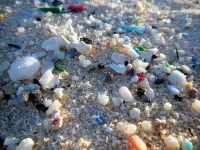Climate change threatens European forests
Well over half of Europe's forests are potentially at risk from windthrow, forest fire and insect attacks
2021-03-01
(Press-News.org) In recent years, European forests have suffered greatly from extreme climate conditions and their impacts. More than half of Europe's forests are potentially at risk from windthrow, forest fire, insect attacks or a combination of these. This is the main result of a study by an international team of scientists with the participation of Henrik Hartmann from the Max Planck Institute for Biogeochemistry in Jena, Germany. Using satellite data and artificial intelligence, the scientists studied vulnerability to disturbances in the period between 1979 and 2018. In the light of ongoing climate change, their findings are very important for improving mitigation and adaptation strategies as well as forest management to make European forests more resilient for the future.
Forests cover a good third of Europe's land mass, play an important role in regulating the climate, and provide a wide range of ecosystem services to humans. However, in recent decades climate change has made forests increasingly vulnerable to disturbances. Forest structure and prevailing climate largely determine how vulnerable forests are to perturbations and vulnerability to insect infestations has increased notably in recent decades; especially in northern Europe. The boreal coniferous forests in cold regions and the dry forests of Iberian Peninsula are among the most fragile ecosystems.
Insect infestations increasingly put forests at risk
Henrik Hartmann, research group leader at the Max Planck Institute for Biogeochemistry, observes forest responses from an ecophysiological perspective and sums up "The experience of recent years, especially since 2018, has clearly shown that the threat to forests posed by insect pests has particularly increased with ongoing climate change. There is a risk that further climate warming will increase this trend."
Extreme weather conditions such as heat waves and drought weaken trees and make them vulnerable to insect pests. "This finding is not new, and forests are normally well adapted to deal with occasional climate extremes. The fact that these extremes are now occurring so frequently and repeatedly makes the exception the norm, and forests cannot cope with that situation," the expert explains.
Old trees are particularly vulnerable
The study also shows that large and old trees are particularly vulnerable to climatic extremes. In recent drought years, this has also been observed in Central European beech forests, where an increasing number of old trees suddenly died. "This is because their water transportation system has to work under greater stress to transport water from the soil through the roots and up into the high-up crown. As a result, large trees suffer more from drought and are then more susceptible to disease."
Large and older trees are also preferred hosts for harmful insects. For example, the European spruce bark beetle, which mainly attacks adult spruce trees, prefers to fly to larger individuals. In addition, large trees also provide a greater area for wind attacks during storm events. "The results of the study are conclusive from both an ecological and an ecophysiological perspective," summarizes Henrik Hartmann.
Existing European forests will not necessarily disappear, but many of them could be severely damaged by anticipated climate change-induced disturbances and important ecosystem services could be impaired by the loss of especially large and old trees.
INFORMATION:
Original publication
Giovanni Forzieri, Marco Girardello, Guido Ceccherini, Jonathan Spinoni, Luc Feyen, Henrik Hartmann, Pieter S.A. Beck, Gustau Camps-Valls, Gherado Chirici, Achille Mauri, Alessandro Cescatti
Emergent vulnerability to climate-driven disturbances in European forests
Nature Commununications 12, 1081 (2021)
ELSE PRESS RELEASES FROM THIS DATE:
2021-03-01
Materials called perovskites can be more readily incorporated into silicon-based semiconducting platforms by using a microfluidic pumping technology developed at KAUST.
The perovskites currently being explored for many applications in new technologies are diverse materials sharing the same crystalline structure as the natural mineral perovskite. These semiconducting materials show great promise in a variety of optoelectronic applications, such as light emitters, sensors and solar cells.
Compared to traditional semiconductors, perovskites are soft and unstable. "This makes it difficult to pattern them using standard lithography methods," says materials scientist Iman Roqan at KAUST.
The challenge tackled by Roqan and her colleagues was to adapt microfluidic technologies to manipulate ...
2021-03-01
COLUMBUS, Ohio - Parents may fear that if their high school student isn't motivated to do well in classes, there's nothing that will change that.
But a new study that followed more than 1,600 students over two years found that students' academic motivation often did change - and usually for the better.
Results showed that increasing students' sense of "belongingness" in school was one key way of increasing academic motivation.
"Our results point to a more hopeful picture for students who start out with lower levels of motivation - they tend to shift toward more adaptive ...
2021-03-01
March 1, 2021 - A new paper published online in the Annals of the American Thoracic Society discusses how smoking may affect risk for COVID-19 and the types of research that are needed to better understand the link between smoking and COVID-19 risk.
In "Smoking and COVID-19: The Real Deal," Enid Neptune, MD, and Michelle N. Eakin, PhD, of the Division of Pulmonary and Critical Care Medicine, Johns Hopkins University, discuss research to date on this topic and propose areas of research that can help clarify this relationship.
Studies have shown that current smokers with COVID-19 have twice the ...
2021-03-01
New research has determined the prevalence of private security systems may be robbing the general public of the police services they need.
Dr. Ross Hickey is an economist in UBC Okanagan's Faculty of Management and the Irving K. Barber Faculty of Arts and Social Sciences. Along with a team of researchers, Hickey examined data from a social survey of Canada victimization, where people answered whether they had added security measures to their homes to protect themselves from crime.
"We are seeing more expenditures on private security systems installed in homes and, as economists, we have to ask why. We know that crime rates are down and expenditure on police is up," says Hickey. "But private security purchases are at an all-time ...
2021-03-01
CORVALLIS, Ore. - Selectively cutting trees in riparian zones to aid forest restoration can be done without adversely affecting streams' water temperature as long as the thinning isn't too intensive, new research by Oregon State University shows.
Published in PLOS One, the study led by OSU College of Agricultural Sciences graduate student David Roon is one of the few to quantify restorative thinning's effects on forest streams.
"We don't know much about what happens with the more subtle changes in shade and light that come with thinning," Roon said. "Most of the research so far has looked at the effects of clearcutting with no stream-side buffer at all, or harvests outside of an untouched buffer area. And regulatory requirements ...
2021-03-01
Around 2.5 billion years ago, our planet experienced what was possibly the greatest change in its history: According to the geological record, molecular oxygen suddenly went from nonexistent to becoming freely available everywhere. Evidence for the "great oxygenation event" (GOE) is clearly visible, for example, in banded iron formations containing oxidized iron. The GOE, of course, is what allowed oxygen-using organisms - respirators - and ultimately ourselves, to evolve. But was it indeed a "great event" in the sense that the change was radical and sudden, or were the organisms alive at the time already using free oxygen, just at lower levels?
Prof. Dan Tawfik of the Weizmann Institute of Science's Biomolecular Sciences Department explains that the dating of the GOE ...
2021-03-01
HOUSTON - (March 1, 2021) - Rice University physicists have discovered a way to trap the world's coldest plasma in a magnetic bottle, a technological achievement that could advance research into clean energy, space weather and astrophysics.
"To understand how the solar wind interacts with the Earth, or to generate clean energy from nuclear fusion, one has to understand how plasma -- a soup of electrons and ions -- behaves in a magnetic field," said Rice Dean of Natural Sciences Tom Killian, the corresponding author of a published study about the work in Physical Review Letters.
Using laser-cooled strontium, ...
2021-03-01
Europeans spend more than £700 billion (€800bn) a year on recreational visits to water bodies - but perceived poor water quality costs almost £90 billion (€100bn) in lost visits, a new study has found.
The new research - led by a European collaboration involving the University of Exeter and the University of Stirling - used data from 11,000 visits in 14 different countries to analyse the economic value of water bodies, such as rivers, lakes, waterfalls, beaches and seaside promenades.
The research team estimated that people spend an average of £35 (€40) travelling to and from these sites, with a typical family making 45 such trips each year.
The team also found ...
2021-03-01
Rutgers scientists for the first time have pinpointed the sizes of microplastics from a highly urbanized estuarine and coastal system with numerous sources of fresh water, including the Hudson River and Raritan River.
Their study of tiny pieces of plastic in the Hudson-Raritan Estuary in New Jersey and New York indicates that stormwater could be an important source of the plastic pollution that plagues oceans, bays, rivers and other waters and threatens aquatic and other life.
"Stormwater, an understudied pathway for microplastics to enter waterways, had similar or higher concentrations of ...
2021-03-01
DALLAS, March 1, 2021 — Studies representing nearly 2 million adults worldwide show that eating about five daily servings of fruits and vegetables, in which 2 are fruits and 3 are vegetables, is likely the optimal amount for a longer life, according to new research published today in the American Heart Association’s flagship journal Circulation.
Diets rich in fruits and vegetables help reduce risk for numerous chronic health conditions that are leading causes of death, including cardiovascular disease and cancer. Yet, only about one in 10 adults eat enough fruits or vegetables, according to the U.S. Centers for Disease Control and Prevention.
“While groups like the ...
LAST 30 PRESS RELEASES:
[Press-News.org] Climate change threatens European forests
Well over half of Europe's forests are potentially at risk from windthrow, forest fire and insect attacks



